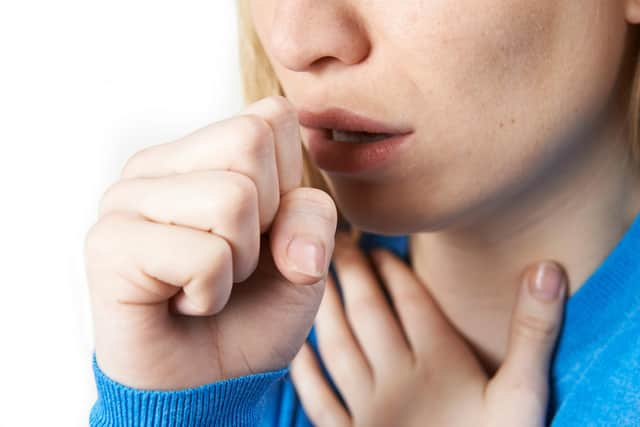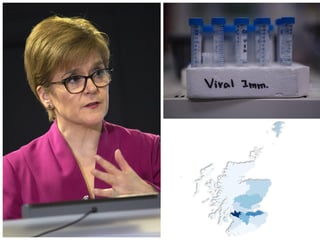Symptoms of coronavirus: signs of Covid-19 according to the NHS - and how long they take to appear
People across the UK are wondering at what point they might need to self isolate, after the government announced a radical change of direction in their attempt to tackle coronavirus.
The NHS has published this advice for people who feel they may have Covid-19 symptoms and are worried about when to stay at home.


The symptoms you should not ignore
Advertisement
Hide AdAdvertisement
Hide AdThe NHS says that you should stay at home for a week if you have either:
A high temperature (you feel hot to the touch on your chest or back) A new, continuous cough (this means you have started coughing repeatedly)
If you have either symptom, or both, you should not go to your GP surgery, pharmacy or hospital. Doing so risks spreading Covid-19 to elderly or sick people.
If I have the symptoms do I need to get tested?
The government is currently only testing people who have severe symptoms and have been hospitalised. If you only have a cough or a temperature, you do not need to be tested for Covid-19.
You should stay at home for at least seven days and wait for your symptoms to go completely.
Getting further help
You may need more urgent help from the health service if:
You feel you cannot cope with the severity of your symptoms Your condition gets worse or you develop new symptoms (like breathing difficulties) You do not recover after a week in self-isolation
If you feel you need more assistance, you can call 111 or visit their website.
The dos and don’ts of self-isolating
The NHS has published advice to help people successfully self-isolate when living with other people who have not developed symptoms.
Advertisement
Hide AdAdvertisement
Hide AdTo prevent passing on the virus to family members or flatmates, you should:
Try to keep at least two metres from other people in your home, particularly older people or those with long-term health conditions Ask friends and family and delivery services to deliver things like food shopping and medicines – but avoid contact with them Sleep alone if possible Regularly wash your hands with soap and warm water for at least 20 seconds Drink plenty of water and take everyday painkillers, such as paracetamol, to help with your symptoms
The NHS says that you should NOT:
Have visitors (ask people to leave deliveries outside) Leave the house, for example to go for a walk, to school or public places.Coronavirus: the facts
What is coronavirus?
COVID-19 is a respiratory illness that can affect lungs and airways. It is caused by a virus called coronavirus.
What caused coronavirus?
The outbreak started in Wuhan in China in December 2019 and it is thought that the virus, like others of its kind, has come from animals.
How is it spread?
As this is such a new illness, experts still aren’t sure how it is spread. But, similar viruses are spread in cough droplets. Therefore, covering your nose and mouth when sneezing and coughing, and disposing of used tissues straight away is advised. Viruses like coronavirus cannot live outside the body for very long.
What are the symptoms?
The NHS states that the symptoms are: a dry cough, high temperature and shortness of breath - but these symptoms do not necessarily mean you have the illness. Look out for flu-like symptoms, such as aches and pains, nasal congestion, runny nose and a sore throat. It’s important to remember that some people may become infected but won’t develop any symptoms or feel unwell.
What precautions can be taken?
Washing your hands with soap and water thoroughly. The NHS also advises to cover your mouth and nose with a tissue or your sleeve (not your hands) when you cough or sneeze; put used tissues in the bin immediately and try to avoid close contact with people who are unwell. Also avoiding touching eyes, nose and mouth unless your hands are clean.
Government advice
Advertisement
Hide AdAdvertisement
Hide AdAs of Monday 16 March the government advised that everyone should be observing social distancing - avoiding unnecessary travel and working from home where possible. Anyone with a cough or cold symptoms now needs to self-isolate with their entire household for 14 days.
The government has now instructed bars, restaurants and theatres to close and will review on a ‘month to month’ basis. Schools closed from Friday 20 March for the foreseeable future, and exams have been cancelled.
The over 70s or anyone who is vulnerable or living with an underlying illness are being asked to be extra careful and stay at home to self-isolate.
For more information on government advice, please check their website.
Should I avoid public places?
The advice now is to avoid public places and any non-essential travel. Travel abroad is also being advised against for the next 30 days at least, and many European countries have closed their borders.
What should I do if I feel unwell?
Don’t go to your GP but instead call NHS 111 or look online at the coronavirus service that can tell you if you need medical help and what to do next.
When to call NHS 111
The NHS 111 website should be used if you feel unwell with coronavirus symptoms, have been in a country with a high risk of coronavirus in the last 14 days or if you have been in close contact with someone with the virus. Do not call NHS 111 if your symptoms are mild.
Sources: World Health Organisation and NHS
